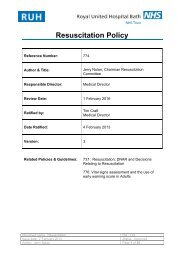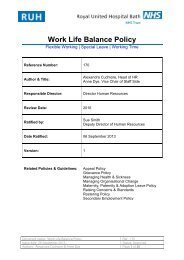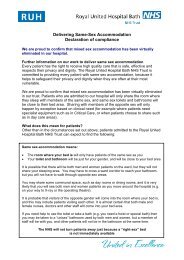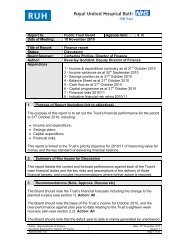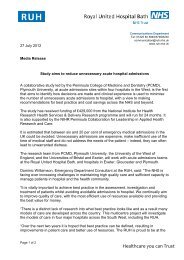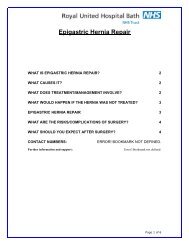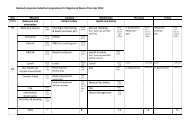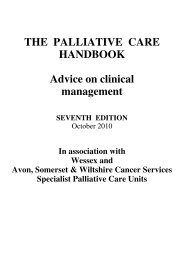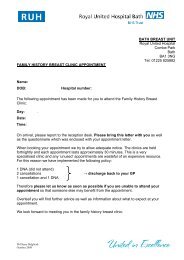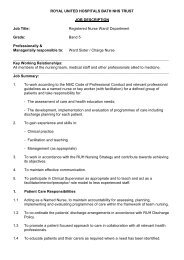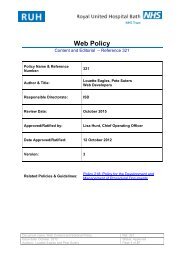Treatments for Bowel Cancer - Royal United Hospital Bath NHS Trust
Treatments for Bowel Cancer - Royal United Hospital Bath NHS Trust
Treatments for Bowel Cancer - Royal United Hospital Bath NHS Trust
You also want an ePaper? Increase the reach of your titles
YUMPU automatically turns print PDFs into web optimized ePapers that Google loves.
ContentsThe Colorectal Team 1Introduction 2What is the large bowel? 4Diagnostic tests 6Treatment options 9Surgery 11Operations(i)-(ix)After your operation 14<strong>Bowel</strong> <strong>Cancer</strong> staging 22Your treatment plan 24Follow up 25Signs and symptoms 25Glossary 27Useful contacts 30
The Colorectal TeamThese are the people in the Colorectal team who you may meetwhen you come in <strong>for</strong> treatment or an appointment at the hospital:Colorectal Nursing Department 01225 825836Colorectal Nurse Specialists:Siobhan JohnAllison RossiterLorraine YoungCo-ordinator:Lucinda KnightColorectal Surgeons:Mr Stephen Dalton 01225 824922Mr Anthony Holbrook 01225 824545Mr Jeremy Tate 01225 824543Mr Michael Williamson 01225 824922Oncologists:Dr Emma De Winton 01225 824797Dr Louise Medley 01225 824797Dr Gareth Rees 01225 824321Chemotherapy Suite 01225 824852Radiotherapy Reception 01225 825910Stoma Care Nurse Specialists: 01225 824056Hazel BrooksLouise JefferyBart Tappe1
Your planned operation is:…………………………………………………………………………Your surgical consultant is:IntroductionThis booklet is intended to support any in<strong>for</strong>mation you have beengiven by your doctor or colorectal nurse specialist (CNS)regarding your <strong>for</strong>thcoming treatment and/or operation and yourrecovery and ongoing care.More detailed in<strong>for</strong>mation on all aspects of your cancer can beobtained from Macmillan (contact details are given at the back ofthis booklet).Within the <strong>Royal</strong> <strong>United</strong> <strong>Hospital</strong> <strong>Bath</strong> (RUH) there is also a<strong>Cancer</strong> In<strong>for</strong>mation and Support Centre. This centre can provideyou with in<strong>for</strong>mation and advice regarding financial help, benefitsand counselling support.Medical words and terms can be found with an explanation in theglossary on page 27.…………………………………………………………………………Your colorectal nurse specialists (CNS) are:• Siobhan John• Lorraine Young• Allison RossiterThe CNS will co-ordinate all your tests and results and supportyou in your on-going care.2
If you have any questions please contact the Colorectal NursingDepartment between 9am and 5pm on week days.If you need to leave a message, they will aim to return your callwithin 24 hours.Alternatively you can ring the hospital switchboard on01225 428331 and ask <strong>for</strong> them to be contacted via their bleep:Lorraine Young/Siobhan John - bleep number 7972Allison Rossiter - bleep number 78443
What is the Large <strong>Bowel</strong>?The digestive system – which is also known as the gastrointestinal tract – breaks down, digests and absorbs food, andremoves solid waste from the body.The digestive system is a continuous muscular tube whichextends from the mouth to the anus. Food is put into the mouthand chewed and then passes down the gullet (oesophagus) to thestomach and into the small bowel.4
As food passes through the small bowel it is digested andessential nutrients are absorbed by the body. From here foodpasses into the large bowel (colon).The colon is 1 metre in length and is divided into four segments:ascending colon, transverse colon, descending colon and sigmoidcolon.The main functions of the colon are the absorption of water, bilesalts and electrolytes from food, and the storage of waste matter.The waste (stool or faeces) moves along all four segments of thecolon and passes out of the rectum (back passage) via the anusas a bowel movement. The rectum is about 20cm long and acts asan internal reservoir to hold the stool.5
Diagnostic TestsIt may be necessary <strong>for</strong> you to have one or more of the followinginvestigations:Blood testsBlood tests are taken to check your general health.ColonoscopyThis test allows the doctor to look directly at the lining of the largebowel (colon). In order to do the test a long flexible tube which hasa camera and a bright light at the end is passed through the anusto the large bowel.If anything abnormal is found the doctor can take a small sampleof tissue (a biopsy) <strong>for</strong> analysis. To allow a clear view of the bowelthe colon must be completely empty of waste material.To ensure that the bowel is empty when you come in <strong>for</strong> this test,you will be sent dietary advice and a laxative to take at home priorto admission.Flexible SigmoidoscopyThis test also allows the doctor to look directly at the lining of thelarge bowel (colon), but only the lower third of the bowel isexamined.Computerised Tomography (CT scan)A CT scan is a special type of X-ray examination in which an X-ray machine is connected to a computer which produces crosssectionalimages of the body.For the scan we will ask you to lie on a table and be passedthrough the scanner which is a ring-like structure. A CT scangenerally takes about 10-20 minutes and is completely painless.6
You may be advised to arrive in the CT department an hour and ahalf be<strong>for</strong>e the CT is scheduled to take place as some patients willneed to have a special drink which contains some X-ray dye toimprove the quality of the scan pictures.CT Colonogram (Virtual Colonoscopy)In order to prepare <strong>for</strong> this type of scan, you will be asked to followsome instructions regarding diet <strong>for</strong> several days be<strong>for</strong>ehand andtake a laxative the day be<strong>for</strong>e the scan.Once at the RUH, a small tube is placed just inside the rectumthrough which some air will be passed to inflate the bowel. Youmay also be given a small injection into your arm which has theeffect of relaxing the bowel muscle.Some harmless carbon dioxide gas is introduced into the rectumin order to inflate the bowel. No sedative is given. Two scans arethen taken, one with you lying on your tummy and one with youlying on your back.Each CT scan takes about 20 seconds and you will be asked tohold your breath during this. The whole examination takes about20 minutes.MRI – Magnetic Resonance Imaging ScanMRI uses a strong magnetic field to produce detailed images ofthe rectum and sometimes the liver. The scanner uses a largecylindrical magnet which surrounds the patient in the <strong>for</strong>m of alarge tunnel. This is painless and takes 30-40 minutes.7
Multi-disciplinary team meetingOnce you have had all of your tests, your case will be discussedat a multi-disciplinary team meeting (MDM). This meeting takesplace on a Thursday morning and involves a group of specialistdoctors: surgeons, oncologists, gastroenterologists, radiologists,pathologists and the colorectal nurses.All the relevant treatment options will be considered and anindividual treatment plan will be developed which will be discussedwith you at your outpatient appointment.Outpatient appointmentAt your first outpatient appointment with a consultant colorectalsurgeon you will also meet a colorectal nurse specialist (CNS)who specialises in bowel cancer.Prior to your outpatient appointment you may already have hadsome investigations. The consultant will explain the results of yourinvestigations and discuss your options and treatment plan withyou.Within 1-2 weeks of your appointment your GP will receive a lettersummarising this consultation. You may also request a copy ofthis letter <strong>for</strong> your own records.8
Treatment optionsRadiotherapy <strong>for</strong> Rectal <strong>Cancer</strong>Radiotherapy treats cancer by using high-energy rays to destroycancer cells while doing as little harm as possible to normal cells.Radiotherapy isn’t painful but you do have to be still <strong>for</strong> a fewminutes during treatment. Radiotherapy doesn’t make youradioactive and it is perfectly safe <strong>for</strong> you to be with other peopleincluding children throughout your treatment.Radiotherapy may be given be<strong>for</strong>e your surgery to shrink a cancerand make it easier to remove. It may also reduce the chance ofthe cancer coming back. Your doctor will discuss with you whethera short course or long course of radiotherapy is recommended.A short course of radiotherapy consists of five daily treatmentsgiven over a week just be<strong>for</strong>e your surgery.A long course of radiotherapy is given every weekday <strong>for</strong> fiveweeks. This is usually given with chemotherapy, which can helpmake the radiotherapy more effective.If radiotherapy treatment is recommended <strong>for</strong> you an outpatientappointment with an oncology consultant will be arranged todiscuss this treatment in more detail. Please ask any questionsthat you have at any stage of your treatment.ChemotherapyChemotherapy is the use of special anti-cancer drugs designed tokill cancer cells. The decision to use chemotherapy depends onthe extent (stage) of the cancer and can be used on its own,alongside radiotherapy or after surgery.9
Chemotherapy is usually given as a series of sessions oftreatment, each session being followed by a rest period – this isknown as a ‘cycle’ of treatment. Chemotherapy used to treatbowel cancer can be given by mouth (in the <strong>for</strong>m of capsules ortablets) or by injection into the vein (as an injection or infusion).An oncology consultant and chemotherapy nurse will discuss thistreatment in detail if it is recommended <strong>for</strong> you.Colonic Stent InsertionIf your bowel is partially or completely obstructed and surgery isnot recommended then your doctor may suggest that you have acolonic stent inserted. A colonic stent is a small flexible, hollowtube that is inserted into your rectum. Once in place the stentexpands to re-open the blocked section of bowel.Your doctor will discuss this procedure with you in detail and youwill be asked to sign a consent <strong>for</strong>m. The procedure takes place inthe X-Ray department and takes approximately 60-90 minutesdepending on your individual circumstances.For more detailed written in<strong>for</strong>mation about this procedure pleasecontact the Colorectal Nurses.10
SurgeryPre-operative Assessment (POA) ClinicPrior to your surgery you will receive a letter confirming anappointment in the POA clinic and a letter to confirm the date ofyour operation. The POA clinic is located on the first floor of zoneB (B39) and the contact number is 01225 821604.This appointment usually lasts 2 to 3 hours and we advise thatyou bring along a relative or close friend who can support you inplanning your care and recovery. You will meet an EnhancedRecovery Nurse during this appointment. You will have a bloodtest and you will be asked some questions about your generalstate of health. You may meet an anaesthetist and be givenwritten in<strong>for</strong>mation about anaesthesia and types of pain reliefincluding epidurals.This is a good time to discuss any further questions that you mayhave about your operation.If your Consultant has explained that you might need to have astoma <strong>for</strong>med as part of your operation, you will also be seen bythe Stoma Care Nurse Specialists who will talk to you and giveyou written and practical in<strong>for</strong>mation.<strong>Bowel</strong> preparationYou will be advised about the need <strong>for</strong> bowel preparation whenyou have your POA appointment. In a few cases your Surgeonmay want you to have a laxative to empty your bowels. If you areasked to take this laxative you will experience some abdominalcramps and have your bowels opened several times very urgently.Your Surgeon may decide that your bowel does not needpreparing in this way but you may be required to have an enema11
on the morning of your operation in order to empty the last part ofthe bowel.Your admissionPrior to your operation you will be sent a letter to confirm the dateand time of your admission to hospital. Most patients are admittedon the morning of their surgery to the Admissions Suite (B32)which is located next to Robin Smith Ward on Level 1 of zone B -their contact number is 01225 825710. If the possibility of having astoma <strong>for</strong>med as part of your operation has been mentioned toyou, a Stoma Care Nurse Specialist will see you and put a markon your tummy unless this has already been done.The nursing staff on the Admissions Suite will help get you ready<strong>for</strong> your operation. You will be taken to Theatre directly from theAdmissions Suite. Following your operation you will return to asurgical ward.OperationsFor most patients, surgery is the mainstay of treatment <strong>for</strong>colorectal cancer. Other treatments may be used in addition. Thetype of surgery depends on the exact nature of each cancer.12
Right HemicolectomyYour operation may be per<strong>for</strong>med partially or completely using alaparoscopic technique (key hole surgery) and this will result inseveral small incisions on your abdomen.The abdomen is also opened with a either a vertical or horizontalincision. The caecum, appendix and ascending colon and rightside of transverse colon are removed together with a fewcentimetres of small bowel.Continuity is restored by joining the two ends of bowel backtogether. The shaded area is the part of the bowel that will beremoved.(i)
Extended Right HemicolectomyYour operation may be per<strong>for</strong>med partially or completely using alaparoscopic technique (key hole surgery) and this will result inseveral small incisions on your abdomen.The abdomen is also opened with a vertical incision which goesaround the umbilicus (tummy button). The caecum, appendix,ascending colon and transverse colon are removed together witha few centimetres of small bowel.Continuity is restored by joining the two ends of bowel backtogether. The shaded area is the part of the bowel that will beremoved.(ii)
Left HemicolectomyYour operation may be per<strong>for</strong>med partially or completely using alaparoscopic technique (key hole surgery) and this will result inseveral small incisions on your abdomen.The abdomen is also opened with a vertical incision which goesaround the umbilicus (tummy button). Part of the transverse colonor descending colon is removed.Continuity is restored by joining the two ends of bowel backtogether. The shaded area is the part of the bowel that will beremoved.(iii)
Sigmoid ColectomyYour operation may be per<strong>for</strong>med partially or completely using alaparoscopic technique (key hole surgery) and this will result inseveral small incisions on your abdomen.The abdomen is also opened with a vertical incision which goesaround the umbilicus (tummy button).The sigmoid colon is removed and continuity is restored by joiningthe two ends – the descending colon and rectum back together.The shaded area is the part of the bowel that will be removed.(iv)
Hartmann's ProcedureThe abdomen is opened with a vertical incision and the diseasedsection of bowel removed.A colostomy is made out of the sigmoid colon and the rectum isover sewn so it finishes in a blind end. The shaded area is the partof the bowel that will be removed.(v)
Anterior ResectionYour operation may be per<strong>for</strong>med partially or completely using alaparoscopic technique (key hole sugery) and this will result inseveral small incisions on your abdomen.The abdomen is also opened with a vertical incision which goesaround the umbilicus (tummy button). The low part of the sigmoidcolon or the high part of the rectum are removed.(vi)
Continuity is restored by joining the two ends together. Theshaded area is the part of the bowel that will be removed.Sometimes it is necessary to rest the ‘join’ in the rectum and <strong>for</strong>ma temporary stoma called an ileostomy (or very occasionally acolostomy). The purpose of the stoma is to keep the bowelmotions away from the join whilst it heals. If you require atemporary stoma it is usual <strong>for</strong> you to meet a Stoma Care Nursebe<strong>for</strong>e the operation to discuss this in more detail.(vii)
Abdomino — Perineal Excision of Rectum (APER)This operation removes the entire rectum and anal canal. This willmean the <strong>for</strong>mation of a permanent colostomy (stoma). Theoperation may be per<strong>for</strong>med with an open vertical incision or byusing a laparoscopic technique (key hole sugery) which will resultin several small incisions on your abdomen.The rectum and anus are removed through a second incision inthe perineum (bottom). After the operation you will have a wound(viii)
and a stoma on your abdomen and a wound between yourbuttocks where the anus has been closed.A permanent colostomy (stoma) is <strong>for</strong>med out of the sigmoidcolon. The shaded area is the part of the bowel that will beremoved.(ix)
Endoluminal SurgeryPolyps or some small cancers can be curatively excised byTransanal Endoscopic Microsurgery (TEMS). TEMS is a minimallyinvasive technique <strong>for</strong> the local resection of rectal polyps andtumours.This procedure is carried out using specially designedmicrosurgical instruments that make it possible to excise lesionsinside the rectum that otherwise would be accessible only bymajor abdominal surgery.If TEMS is recommended <strong>for</strong> you, your Consultant will discuss thisin more detail.13
After your operationEnhanced Recovery ProgrammeWhen you are admitted to hospital <strong>for</strong> your bowel operation youwill take part in the Enhanced Recovery Programme. We aim toget you back to full health as soon as possible after youroperation.The usual length of stay in hospital <strong>for</strong> this type of surgery isbetween 3 and 7 days. Research indicates that the earlier you getout of bed after surgery and start eating, drinking and mobilisingthe better. This will speed up your recovery making it less likelythat complications will develop. You will be encouraged to take anactive role in your recovery.During your hospital stay there will be daily goals which you will beencouraged to achieve. A team of doctors, nurses and otherhealth care professionals will be monitoring your progress and willsupport you in reaching your goals.Your recoveryImmediately after your operation you will go into a room called thepost-anaesthetic care unit (Recovery) so that nurses can monitorand observe you closely until it is safe <strong>for</strong> you to return to theward.When you start to come round after your operation you may findyou have a little tube in your mouth, this is to help you breathe.Try not to worry, you will automatically spit this out and that isperfectly normal.14
When you arrive on the ward you may still feel quite sleepy, thenurses will help to make you com<strong>for</strong>table and regularly check yourblood pressure, pulse, breathing rate and temperature.How soon will I get out of bed?On the day of your operation you may be encouraged to get upand sit out of bed <strong>for</strong> a couple of hours. This is to reduce the riskof any complications and to help speed up your recovery.You will be encouraged to walk around the ward and to the diningroom several times each day.Research has shown that it is important to be mobile as soon aspossible after an operation to reduce the risk of blood clots, chestinfections and pressure sores.To further reduce the risk of developing blood clots you will begiven a small daily injection of a blood thinning drug.Will I have any pain?We will aim <strong>for</strong> you to be as pain free as possible. Somediscom<strong>for</strong>t is to be expected especially when getting in and out ofthe bed or chair. Painkillers will usually be given through acontinuous infusion (Epidural) or given as tablets once you starteating and drinking. It is very important that you tell the nurselooking after you if you have any pain after your operation.If you have had laparoscopic (keyhole) surgery you may sufferwith referred pain which may be felt between your shoulderblades.15
When will my bowels start working?After your operation your bowels will slow down or may stopworking as a reaction to being handled. The doctors will feel andsometimes listen to your abdomen to see if your bowel is startingto work again.In most cases you will be encouraged to drink on the day of youroperation and start eating that evening or the next morning. It maytake a few days <strong>for</strong> your appetite to recover so it is best to eat littleand often rather than a large meal. It is important to drink well andyou may also be offered high calorie drinks.While you are not eating and drinking, fluid will be administered toyou through a drip in your arm or hand.If you have had a stoma <strong>for</strong>med, initially blood stained fluid will bein the bag. Within a few days the bag will start filling with wind andstool. The stoma care nurse will teach you how to look after yourstoma.Will I be sick after the operation?After having an operation some people feel sick. If you experienceany nausea or sickness after your operation please tell a nursewho will be able to give you some anti-sickness drugs.You should stop feeling sick once you start to have your bowelsopened or once your stoma starts to work.Passing urineA catheter (tube) will be placed into your bladder to enable yourkidneys to drain away urine. This tube will be removed within afew days.16
Wound drainsAfter any operation it is normal <strong>for</strong> blood and fluid to be produced,sometimes you may require a tube from your abdomen to drainany excess fluid.The amount will be measured and as it becomes less the drain willbe removed. Ask the nurse <strong>for</strong> some pain relief be<strong>for</strong>e the drain isremoved if you are in any way concerned.StitchesYour wounds may be closed with dissolvable sutures which areunder the skin surface; these do not need to be removed.However if your wounds have sutures or clips that requireremoval, arrangements <strong>for</strong> this to happen will be made <strong>for</strong> you8-10 days after your operation. The ward staff will discuss thesearrangements with you when you go home.QuestionsIf you have any questions at any time ask the ward nurses,doctors or your CNS. They will be only too pleased to explainanything that concerns you or your family.Good tip: Write your thoughts and questions down so that you donot <strong>for</strong>get to ask!Going home<strong>Hospital</strong> stays can vary depending on the complexity of youroperation and whether you have participated in the EnhancedRecovery Programme. The usual length of stay in hospital isbetween 3 and 7 days depending on your type of surgery.17
Day to day activitiesIllness unsettles your lifestyle. However the best indicator is you!There is no reason why you should not resume or continue withyour work or social activities when you feel well enough.After the operation you are advised not to lift heavy objects <strong>for</strong>about six weeks. If you participate in any sports or exercise,introduce it back into your lifestyle gradually.It is important that you rest adequately. Always accept offers ofhelp with shopping, housework or jobs around the house until youfeel well enough to resume your normal activities.There is no reason why you should not go on holiday but discussthis with your colorectal nurse or doctor.Driving your carIt is advisable not to drive <strong>for</strong> at least 2 weeks after your operation.You will need to check with your insurance company and be ableto do an emergency stop com<strong>for</strong>tably be<strong>for</strong>e starting to driveagain.DietOnce you have returned home there are no dietary restrictions onwhat you can eat and drink. Try to have protein enriched food(meat, fish, eggs) as these foods are good <strong>for</strong> healing. It isadvisable to have a well balanced diet of fruit, vegetables, andwhole wheat cereals and bread.However, in the first few weeks after the operation it may be wiseto peel away fruit skins and avoid green vegetables and sweetcorn.18
<strong>Bowel</strong> functionProblems may include diarrhoea, constipation or alternating boutsof constipation and diarrhoea.Constipation: It is important to eat a high fibre diet, mobilise gentlyand to drink at least 2 litres of fluid each day. This can be made upof soup, tea, coffee, juice and squash, although it is advisable toavoid drinking a lot of tea and coffee because it contains caffeineand can cause dehydration and constipation.Diarrhoea: It is not unusual, after an operation on your bowels, tohave slightly looser stools and some urgency. There<strong>for</strong>e if you feelyou want to open your bowels do not try to hold on, but go to thetoilet immediately.Generally, the large bowel (colon) adapts with time and controland consistency of stools improves.Please do not hesitate to contact your CNS who can give adviceand support either over the telephone or when you have a followupappointment in clinic. There is a lot that can be done to helpimprove bowel function.If you experience diarrhoea it is important to keep drinking to keepyour body hydrated.It may help to avoid food and dairy products <strong>for</strong> 24 hours and oncethe diarrhoea stops try eating dry, bland food, toast, crackers etc,and slowly return to a full diet. Some people believe live yoghurtpreparations help.If either of these symptoms persist it is important to contact yourGP or Colorectal Nurse who may be able to advise on suitablemedication.19
Although this can be upsetting do remember that your bowelfunction should continue to improve over the next two years.Sexual activitiesMany people are able to continue their usual sexual activity oncethey have physically recovered from the effects of the surgery.However, libido (sex drive) often decreases after surgery andduring chemotherapy, although this is most likely to be temporary.If you have had an operation to remove your rectum (backpassage) there is a risk that you may suffer from impotence.If you have concerns about particular aspects of your sexualactivity please do not hesitate to contact your CNS who mayadvise you or may ensure you are referred to a relevant specialist.PathologyAfter your operation, the piece of bowel containing the cancer willbe sent <strong>for</strong> examination to a pathologist (a doctor who has beentrained to examine tissue cells under a microscope). The results ofthis examination are called ‘histology’ results.Multi-disciplinary meetingThe decision as to whether you may benefit from chemotherapy ismade at the multi-disciplinary meeting (MDM) which involves thesurgeons, oncologists, radiologists, pathologists and the colorectalnurses.A few weeks after your operation a colorectal nurse specialist islikely to contact you by phone to find out how you are recoveringafter your operation. Your histology results can be explained toyou over the telephone. Depending on your histology results,chemotherapy may be recommended <strong>for</strong> you. If chemotherapytreatment is recommended an appointment will be made <strong>for</strong> you to20
see an oncology consultant a few weeks after your operation todiscuss this in more detail.ChemotherapyChemotherapy may be offered to you after your surgery.Chemotherapy is a treatment given to the whole body. Themedication can be given in the <strong>for</strong>m of an injection into a vein inyour arm or in tablet <strong>for</strong>m.Sometimes a small plastic tube can be inserted into your chest orarm. This will stay there <strong>for</strong> the duration of the chemotherapy andbe used each time you have chemotherapy to avoid usingdifferent veins in your arm each time.Be<strong>for</strong>e each treatment you will have a blood test. One of thereasons <strong>for</strong> this is to check the state of your immune system, aswhile you are undergoing chemotherapy you are less able to fightinfections. The blood test checks that you have enough healthyblood cells to protect you from infection be<strong>for</strong>e your treatment.Side effectsMost of the drugs commonly offered to treat bowel cancer do nothave severe side effects. Hair loss and vomiting are NOT routinelyexpected, unlike some other types of chemotherapy.21
<strong>Bowel</strong> <strong>Cancer</strong> Staging SystemYou may hear your doctor talking about ‘Dukes’ or ‘TNM’ stages.DukesDukes is a simplified sort of classification <strong>for</strong> staging tumoursaccording to their degree of invasion and spread (Dukes A, B, C,D)22
TNMTNM is a more detailed type of staging classification, describing:1. The degree of Tumour invasion (T1 to T4)2. Node involvement (from N0 which is that no lymph nodesare affected, to N2 where there are 4 or more lymph nodesare affected).3. Whether distant Metastases are present or not (also calledsecondaries). MX means cancer spread has not beenidentified. M1 means that it has.23
Your Treatment PlanPre-operativelyCT scanY / N Date………………………………………….....MRI scanY / N Date………………………………………….....Radiotherapy Y/ NDate………………………………………….....Surgical Outpatient appointment date:………………………………..Pre-admission Clinic Date: ……………………………………….....Operation DetailsOperation date: ………………………………………………………….Operation:...……………………………………………………………...Post Operative PlanSurgical appointment date: ………………………………………….…Chemotherapy needed post operativelyY / NOncology appointment date:…………………………………………...Follow up liver scan needed after 1 and 2 yearsY / NExtra scans needed Y / NColonoscopy needed Y / N24
Follow upAround 4-6 weeks after your operation a surgical follow upappointment will be made <strong>for</strong> you. If you have not been in<strong>for</strong>medof your histology results by phone it may be necessary <strong>for</strong> you tohave an earlier appointment. The Doctor will check that you aremaking a good recovery and discuss with you any further teststhat you may need.Recent studies have shown that it is not always necessary <strong>for</strong> youto have regular follow up appointments with a Specialist Doctor.However you may be offered appointments with a ColorectalNurse Specialist who can discuss any problems or concerns thatyou have and organise any relevant tests.Your GP will be sent a letter following any appointments that youhave and will be sent the results of any follow up scans arranged<strong>for</strong> you. You will also be in<strong>for</strong>med of the results of follow up scans.Signs and SymptomsIt is important that you are aware of the signs and symptoms thatcould indicate a further abnormality.If you experience one or more of the following <strong>for</strong> more than 6weeks you should contact your GP or your Colorectal Nurse:1. Loose stools and diarrhoea.2. Increasing bouts of constipation.3. Change of normal bowel action (how often you open yourbowels).4. Blood and / or mucus with your stool.5. Decreased appetite / weight loss.6. Lethargy (lack of energy) – this may be due to anaemia,caused by blood loss from the bowel.25
7. Sometimes people experience a feeling of not being ableto completely empty their bowels (this is known astenesmus).8. Some people experience abdominal (tummy) pain ordiscom<strong>for</strong>t.26
GlossaryAbdomenAnalgesicsAdjuvantChemotherapyAnaesthetistAnusBariumEnemaThe part of the body that contains thestomach, bowel and other digestiveorgans, also known as the tummyPain relievers / killersChemotherapy given after the maintumour has been removedA doctor whose role is to put you tosleep so that you feel no pain duringyour operationThe outlet of the back passageA white solution introduced via the anus,enabling visualization of the colon andrectumBenign A growth which is not cancer ormalignant and does not have the abilityto spread to other organsCatheterChemotherapyColonA flexible tube that allows urine to passout of the bladderTreatment using drugsThe large bowel or intestine27
ColorectalNurse(Specialist)DiagnosisFaecesImmuneSystemLargeIntestineLymph NodeMalignancyMetastasesOncologistPalliative CareA senior nurse who is an expert atlooking after people with large bowelcancer.Determination of the cause of thediseaseMotions, stools, waste productsBlood cells and vessels in your bodywhich fight infectionLarge bowelA gland like mass of tissue that can filtercancer cells from the lymph fluidA growth which is cancerous and so hasthe ability to spread to other organsThe spread of cancer cells to otherdistant parts of the body by way of theblood or lymph fluidA doctor who specialises in cancer careand prescribes chemotherapy andradiotherapyImproving quality of life, by providingsupport and controlling unpleasantsymptoms28
PathologistRadiologistRadiotherapySmall IntestineStomaStoma CareNurse(Specialist)TenesmusTumourA doctor who specialises in making adiagnosis by examining tissue (cells)under a microscopeA doctor who uses scans and X-rays todiagnose and treat diseaseTreatment using X-rays to shrink acancerSmall bowel, part of which is called theileumAn artificial opening in the tummy wallthrough which stool is passed into a bagA senior nurse who is an expert at caring<strong>for</strong> stomasA persistent urge to empty the bowelGrowth, swelling29
Useful ContactsThe following websites and telephone helplines may be useful <strong>for</strong>further in<strong>for</strong>mation.<strong>Bowel</strong> <strong>Cancer</strong> UK: 0800 8403540www.bowelcanceruk.org.ukBeating <strong>Bowel</strong> <strong>Cancer</strong>: 08450 719301www.bowelcancer.orgPenny Brohn <strong>Cancer</strong> Care:Formerly the Bristol <strong>Cancer</strong>Help Centre0845 123 2310www.pennybrohncancercare.orgColostomy Association 0800 3284257www.colostomyassociation.org.ukMacmillan 0808 8080000www.macmillan.org.uk<strong>Cancer</strong> Research UK 0808 8004040www.cancerhelp.org.ukMacmillan <strong>Cancer</strong>In<strong>for</strong>mation and SupportCentrePositive Action on <strong>Cancer</strong>(PAC)Free professional counselling01225 82404901373 455255info@positiveactiononcancer.co.uk30
GAS/001Date of publication: April 2011© <strong>Royal</strong> <strong>United</strong> <strong>Hospital</strong> <strong>Bath</strong> <strong>NHS</strong> <strong>Trust</strong>



